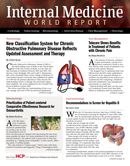Publication
Article
Internal Medicine World Report
Supportive Social Networks Lower Risk of Male Suicide
Author(s):
Men who are socially well-integrated show more than a 2-fold reduced risk of suicide, according to a longitudinal study published in the Annals of Internal Medicine.

Socially well-integrated men showed more than a 2-fold reduced risk of suicide over 24 years of follow-up, according to a long-term study published in the Annals of Internal Medicine. The study’s lead author, Alexander Tsai, MD, PhD, commented that his patients’ social isolation was something he couldn’t ignore. The lack of support systems figure prominently into the patients’ metal health profiles, he said.
Researchers studied nearly 35,000 men aged 40-75 years starting in 1988, to evaluate the hypothesized correlation between social integration and suicide mortality. Every 2 years, participants were mailed a follow-up questionnaire to indicate to researchers their medical history, diet, lifestyle habits, and other health behaviors.
Many participants were in dentistry or veterinary industries at baseline, and were a mean age of 56.6 years. Most (41.5%) were classified into the 2 highest social integration groups. Researchers typically were informed of participants’ suicides — a total of 147 – by the next of kin. The most frequent means were by firearms and explosives (89 participants); poisoning by solid or liquid substances (20 participants); and hanging, strangulation, or suffocation (15 participants). Incidentally, findings suggested those men who committed suicide were ranked in the most socially isolated group. Suicide rates were lowest among participants ranked in the highest- and second-highest socially integrated groups.
In general, there was minimum mobility between the socially-isolated or socially-integrated groups. Marital status, social network size, and religious service attendance were considered positive factors in social integration for the participants.
Throughout 24 years of follow-up, men who were less socially-integrated had a 2-fold increased risk for suicide.
“Taken together, our findings provide an empirical bridge between a sociological understanding of suicide and prevailing clinical and neurobiological models of suicide and suicidal behaviors,” concluded the researchers. “In the prototypical ‘stress-diathesis model,’ a diathesis is conceptualized as a predisposition toward mental illness that is influenced by genetic, biological, or psychological traits and is activated by stressful life events. Acute changes in social integration, such as marital dissolution, are frequently viewed as psychosocial stressors that activate a predisposition to suicide, but social integration may also be conceptualized more broadly as contributing to the diathesis itself.”
In an accompanying editorial, Kerry Knox, PhD, MS, discussed suicide from a public health angle. “A public health approach recognizes that the greatest burden of disease may lie in persons who seem to be at the lowest risk,” she wrote. “A public health approach to suicide prevention facilitates integration of genetic, neurologic, psychological, and sociocultural factors along with the more well-recognized risk factors of psychiatric diagnoses and a history of suicide attempt.”
Knox believes the study addressed important suicide prevention strategies and quantified the importance of a strong social network, though mentions current data do not explain why middle age men are particularly prone to taking their own lives.
“Life is difficult for everyone,” Knox told Reuters. “There are ways we can all help each other cope.”

2 Commerce Drive
Cranbury, NJ 08512
All rights reserved.





